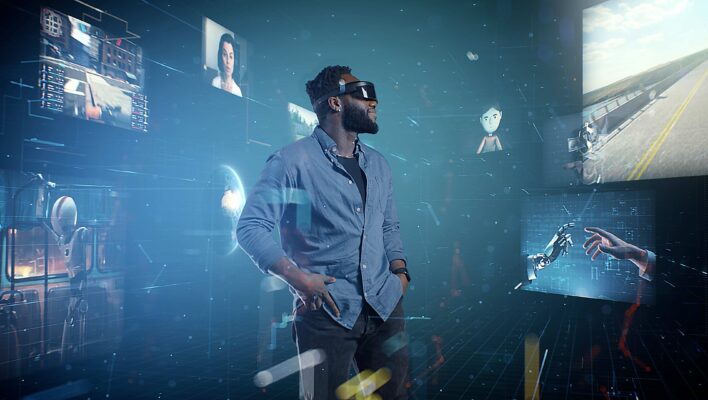The metaverse is rapidly evolving, reshaping how we interact in virtual spaces. Platforms like Roblox and Fortnite showcase this exciting transformation. They highlight the importance of user-generated content and community engagement. As we explore the future of the metaverse, the need to hire game designers becomes increasingly vital. These professionals will help create immersive experiences that captivate users. Furthermore, metaverse development studios and NFT game development companies play crucial roles in this new digital landscape. Let’s dive deeper into what these platforms tell us about the future of the metaverse.
Understanding the Metaverse Through Roblox and Fortnite
Roblox and Fortnite are not merely games; they are pioneering platforms that are shaping the future of the metaverse. Through their unique approaches, they provide a glimpse into how virtual worlds can offer more than just entertainment.
Roblox: A Platform for Creation and Innovation
- Roblox is a platform for creating games and experiences.
- It allows users, especially younger ones, to express creativity.
- Users can develop a variety of games with Roblox’s tools.
- This encourages users to be content creators, not just consumers.
- The platform supports collaboration and sharing of creations.
- The community aspect adds diversity to the experiences in Roblox.
- Roblox serves as a representation of the potential of the metaverse.
Fortnite: Beyond Battle Royale – A Social Phenomenon
Fortnite started as a battle royale game but has transformed into much more. It’s now a social platform where players can attend live events, concerts, and even watch movies together. This evolution shows how traditional gaming can expand into broader experiences within the metaverse.
The platform’s versatility is evident in its ability to host a wide array of virtual events. Fortnite hosts concerts and movie screenings, making it a popular online place for many users. This shows how people can connect and interact in virtual spaces.
Moreover, Fortnite’s continuous innovation and integration of new experiences keep the platform dynamic and engaging. This adaptability is important for the metaverse. It needs to change to fit the needs and wants of its users.
The Convergence of Gaming and Social Interaction
The success of Roblox and Fortnite highlights the convergence of gaming and social interaction within the metaverse. These platforms are not just about playing games; they are about creating social connections and shared experiences. Both platforms let users create groups based on common interests. Users can work together and have important interactions. This social dimension is a key aspect of the metaverse, as it transforms virtual spaces into vibrant, living environments.
The Role of Metaverse Development Companies
As the metaverse continues to grow, these companies play a vital role in shaping its future. These companies are at the forefront of creating the infrastructure that supports virtual worlds and experiences.
Building Immersive Virtual Worlds
Metaverse development companies specialize in creating immersive virtual environments. They use cutting-edge technology to build detailed worlds where users can interact seamlessly. This involves creating complex ecosystems that function in real-time, much like the real world.
These companies employ advanced graphics and physics engines to ensure that virtual environments are both realistic and engaging. This level of detail is essential for creating immersive experiences that captivate users and encourage them to spend more time in the metaverse. Developers are always looking for new tools and methods to improve how they create virtual worlds. This innovation is crucial for keeping the metaverse fresh and exciting.
Integrating Blockchain, NFTs, and New Economic Models
Another significant aspect of the metaverse is the integration of blockchain technology and NFTs (Non-Fungible Tokens). NFT game development companies are exploring how to create unique virtual assets that players can own and trade.
This adds a layer of economic value to virtual experiences, making them more engaging and rewarding. For instance, players can own virtual land, outfits, or items that are truly theirs, thanks to blockchain’s decentralized nature.
Furthermore, these economic models open up new opportunities for monetization within the metaverse. Users can earn real-world income by creating and selling virtual goods, providing a new avenue for creativity and entrepreneurship.
Developing Interoperable and Scalable Systems
A critical challenge for metaverse production companies is creating interoperable and scalable systems. The metaverse must support a vast number of users and a wide range of devices while maintaining a seamless experience.
To achieve this, developers are working on creating platforms that can integrate with various technologies and support cross-platform interactions. This interoperability is essential for creating a cohesive metaverse where users can transition between different virtual environments smoothly.
Scalability is important because the metaverse needs to handle more users and more complex activities. Development companies are using cloud computing and other tools to help the metaverse grow and work well.
The Social Impact of the Metaverse
The metaverse is not just about games; it’s about creating social connections. As seen with platforms like Roblox and Fortnite, the metaverse allows people from different parts of the world to connect, collaborate, and share experiences.
Revolutionizing Education and Training
The metaverse has the potential to revolutionize education and training. Imagine a classroom without walls, where students can interact with 3D models, participate in virtual field trips, and collaborate with peers globally.
Educational institutions and training centers are already exploring these possibilities, creating immersive learning environments that make education more accessible and engaging. Virtual reality and augmented reality technologies are being used to enhance traditional learning methods, providing students with hands-on experiences that are not possible in a traditional classroom setting.
Moreover, the metaverse can facilitate lifelong learning by providing continuous access to educational resources. This can empower individuals to acquire new skills and knowledge at their own pace, fostering a culture of continuous improvement and adaptability.
Enhancing Socialization and Community Building
In the metaverse, socialization takes on a new dimension. People can meet and form communities based on shared interests, regardless of physical location. This can lead to more inclusive and diverse interactions, as barriers such as geography and language are minimized.
The metaverse offers a space where individuals can express themselves authentically and connect with others who share their passions. This sense of belonging is crucial for mental well-being and can help combat feelings of isolation that are prevalent in today’s digital age.
Additionally, the metaverse can serve as a platform for activism and social change. Virtual communities can rally around causes and engage in meaningful discussions, using the metaverse as a tool for raising awareness and driving positive change.
Bridging Cultural Gaps and Fostering Global Understanding
The metaverse can help bring people from different cultures together. It creates a shared online space where they can interact and learn from each other. This can lead to better understanding between different backgrounds.
Users can learn about different cultures, traditions, and ideas in the metaverse. This can help them appreciate diversity more. It can also reduce stereotypes and biases, leading to a more connected and peaceful world.
Moreover, the metaverse can facilitate language learning and exchange, as users can interact with people from different linguistic backgrounds. This can enhance communication skills and promote empathy and understanding across cultures.
Challenges in Developing the Metaverse
Despite its potential, developing the metaverse is not without its challenges. Companies must tackle issues related to technology, privacy, and inclusivity.
Overcoming Technological Limitations
Creating a seamless metaverse experience requires advanced technology and significant computing power. Developers need to ensure that virtual experiences are accessible on various devices, from high-end PCs to smartphones.
To address these challenges, companies are investing in research and development to create more efficient algorithms and technologies. This includes optimizing graphics and rendering processes to reduce latency and improve performance, ensuring a smooth experience for all users.
Moreover, companies are exploring new ways to distribute computational load, such as edge computing and decentralized networks. These approaches can enhance the scalability and accessibility of the metaverse, allowing more users to participate in virtual experiences.
Addressing Privacy Concerns and Ensuring Security
As users spend more time in the metaverse, concerns about privacy and data security become paramount. Companies need to implement robust measures to protect user information and create a safe virtual environment.
Developers are working on implementing encryption and other security protocols to safeguard user data. Additionally, companies are exploring decentralized identity systems that give users more control over their personal information and digital identities.
Furthermore, transparency and accountability are essential for building trust within the metaverse. Companies must communicate clearly with users about data collection and usage practices, ensuring that privacy policies are accessible and understandable.
Ensuring Inclusivity and Accessibility
It’s essential that the metaverse is inclusive and accessible to everyone. Developers must consider factors such as accessibility for people with disabilities and ensure that diverse voices are represented in virtual spaces.
To achieve this, companies are incorporating universal design principles into their platforms, ensuring that virtual experiences are accessible to users with varying abilities. This includes providing options for text-to-speech, customizable interfaces, and other accessibility features.
Moreover, developers are actively seeking input from diverse communities to ensure that the metaverse reflects a wide range of perspectives and experiences. This inclusivity is crucial for creating a metaverse that is welcoming and enriching for all users.
The Future of the Metaverse
The metaverse is still in its early stages, but the potential is vast. As platforms like Roblox and Fortnite continue to evolve, they provide valuable insights into what the future holds.
Unlocking Endless Possibilities
The possibilities in the metaverse are endless. From virtual shopping experiences to online concerts, the metaverse can transform how we interact with the digital world.
As technology continues to advance, new opportunities will emerge for creating innovative and engaging experiences. The metaverse will become a hub for creativity and exploration, offering users a limitless playground for discovery.
Moreover, the metaverse will continue to blur the lines between the physical and digital worlds, creating new opportunities for hybrid experiences that enhance our everyday lives.
Fostering Collaboration Across Industries
As the metaverse grows, collaboration across industries will be crucial. Game developers, technology companies, educators, and more will need to work together to create a cohesive and interconnected metaverse.
This collaboration will drive innovation and ensure that the metaverse evolves in a way that benefits users across the globe. By bringing together experts from different fields, the metaverse can become a truly transformative space that enhances our digital experiences.
Furthermore, cross-industry partnerships can facilitate the integration of new technologies and ideas, ensuring that the metaverse remains at the forefront of technological advancement.
Embracing a New Digital Frontier
The metaverse represents a new digital frontier that holds the promise of transforming how we live, work, and play. As we continue to explore its potential, we must remain mindful of the challenges and opportunities that lie ahead.
By embracing innovation and collaboration, we can unlock the full potential of the metaverse and create a future that is exciting, inclusive, and transformative. The journey toward a fully realized metaverse is just beginning, and it will be fascinating to see how it unfolds in the coming years.
Conclusion
Roblox and Fortnite give us a look at what the metaverse can be. They show a place where creativity, socializing, and technology come together. As companies create new metaverse experiences and games with NFTs, the future of the metaverse looks exciting and full of change.
The journey toward a fully realized metaverse is just beginning, and it will be fascinating to see how it unfolds in the coming years. The metaverse holds the potential to reshape our digital experiences and redefine how we connect with the world around us. As we continue to explore this new frontier, the possibilities are truly limitless.
Keep an eye for more latest news & updates on Internal Insider!










